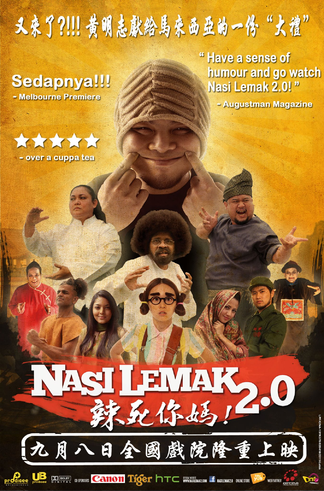As a Malaysian of Chinese descent, the controversial hip-hop artist Wee Meng Chee, AKA Namewee uses his music to comment on the rift between the native and non-native people of his country. As both the director and star of Nasi Lemak 2.0, he utilizes an unusual vehicle – that of a nationally-beloved rice dish – to recognize Malaysia’s many different communities and provide some light satire on how they often view one another.
Namewee plays Hero Huang, a Malaysian master of Chinese cuisine who loses his restaurant when he can’t “localize” his menu to suit the clientele. Broke and desperate to cook again, he reluctantly assists schoolgirl Xiao K (played by singer Karen Kong) when her father and aunt begin fighting over ownership of the family’s Chinese restaurant. In order to decide who will inherit the business, Huang must duel against a former rival to create the most authentic and tasty Chinese dish.
As the competition nears, however, Huang realizes he will need something extraordinary if he wants to win. He enlists the help of a street vendor known for making the best nasi lamek, and she sends him on a journey to three different cities – Kuala Lumpur, Betong and Tanjung Sepat – where he trains with the masters of the dish’s main ingredients. Along the way, he embraces the food and discovers how much it truly reflects the country’s multi-cultural and multi-racial heritage.
Besides cuisine, other art forms are examined in sometimes humorous, sometimes tasteless ways. Part road movie musical, part raunchy comedy (as raunchy as you can get under strict Malaysian censorship), Nasi Lemak 2.0 both celebrates and lampoons various national cinema. While visiting an Indian master of curry, Huang and Xiao break into a Bollywood dance number, poking fun at the genre with lyrics like, “Let’s make curry together, let’s eat curry together, shake your head, wave your hand.” China’s extravagant wire fu movies and vengeful ghost horror flicks (think The Eye) also receive their share of innocent jibes. While the observations are nothing new (who hasn’t made fun of Bollywood movies?) some of the sight gags might stir up a few giggles.
Made on a small budget without government funding, the film relies more on content than on production values, which can cheapen the effect. Most of the jokes are broad and physical in nature, perhaps to appeal to a more universal audience. Actors are decked out in fake facial hair, prop glasses and silly costumes as they mug for the camera, and sometimes, like in the completely random moments when a fart noise occurs, it verges on intolerable.
Under all the juvenile shenanigans, however, Nasi Lemak 2.0 stays true to representing Malaysia as it really is by boasting a multi-ethnic cast and providing an unfiltered view on the state of its society. If anything, the lively film should at least arouse curiosity in those viewers unfamiliar with the country’s history and culture.
Nasi Lemak 2.0 screens July 9th and July 12th at Lincoln Center.


